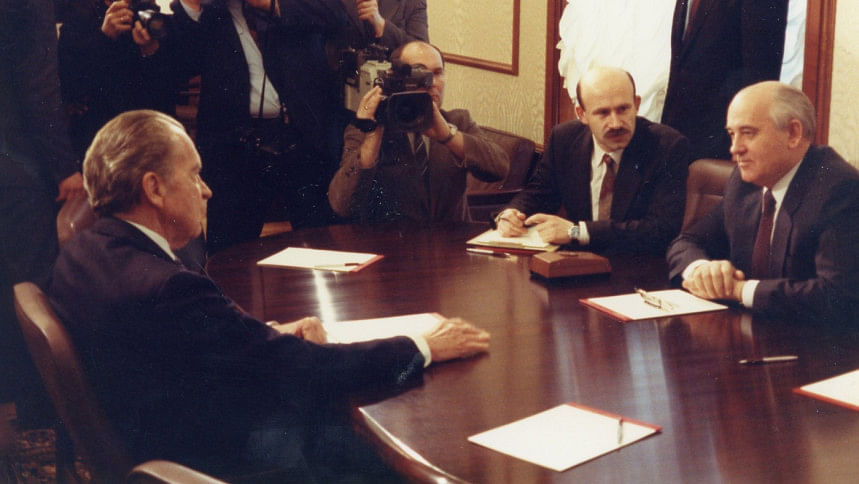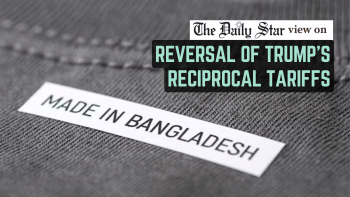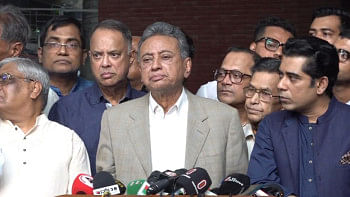Lessons from history: Will Trump’s tariffs shake up world leadership?

Tariffs have an intimate relationship with world leadership among countries. The argument's premise is simple: low/no tariffs depict market competitiveness, raising tariffs implies a sinking ship. Wise leaders learn that lesson, the foolhardy punishes—not rivals, but the masses.
The US's world leadership from the 1940s would have been impossible had President Franklin D Roosevelt (FDR) not adopted the Reciprocal Trade Agreements Act (RTAA) in 1934. He did that to reprieve global trade from the darkest 20th century depression from 1929 to 1939. Caused in part by the US, the Smoot-Hawley legislation imposing 40-60 percent tariffs on over 900 agricultural and manufactured items in June 1930, an angry UK reversed its own free trade accesses from 80 percent to 20 percent through the 1932 Ottawa Agreements, also known as the "Imperial Preference" system, based on "home producers first, empire producers second, and foreign producers last."
Two tectonic changes fed the atmosphere: a leaderless world (which hastened the slide towards World War II), and industrial revolutions destabilising society. Leadership requires followers. In the 1930s, no major country tiptoed another. Anarchy was unavoidable. On the other hand, manual production and farming suddenly faced machines and mechanisation. Just as steel-based factories encroached the RMG economy (with automobiles, tractors, and assembly lines), no-skilled manual workers felt threatened, and evicted farmers crowded towns. Above all, with countries retreating from trade, economic suffocation stared one and all.
The UK reversed the magic it used in 1846 when it eliminated tariffs on corn. Factory workers were new, paid abysmally, and could not buy food. The UK's decision bailed the country out, consolidated its RMG industry's world leadership, encouraged innovations, and made it the global steel leader by the century's end. World War I punctured the British economy, but the Ottawa Agreements closed its world leadership claim. Hitherto nonchalant about world leadership, the US grabbed the opportunity. It had the critical instrument: open the Reciprocal Trade Agreements Act.
In the process, it abandoned its closest 20th century ally, the UK. Doesn't that sound familiar to 2025? So, what can we learn from that?
Germany was the common enemy then, but trade was vital to challenge it. To correct the depression, the UK and the US sent their best economists to Bretton Woods, New Hampshire, in July 1944, for a recovery plan. The UK had one of the 20th century's most illustrious economists, Lord John Maynard Keynes, while an unknown Harry Dexter White represented the US. Cutting a long story short, White's multilateralism proposal (based on free trade) won, and the International Monetary Fund (IMF) and World Bank were born in 1944. Keynes's flamboyance mirrored the UK's imperial approach, one completely antithetical to multilateralism. Having seized the leadership baton, the US freed global trade from 1947 (through the General Agreement on Tariffs and Trade) for a decimated world, offered Marshall Plan funding that same year to help post-war reconstruction, and built the North Atlantic Treaty Organization in 1949 to protect them. All were a tad too costly for any one country to handle.
Trade resumed, based on gold, with the US dollar displacing the British sterling (another leadership feature), with the price fixed at $35 for an ounce of gold. Displayed here is another leadership feature: egotism. If the price was not fixed to one currency, competition would threaten leadership. Particularly amid the Cold War in a crippled world, the US did not want that.
Yet, it paid the price in 1971. Too much free-riding on US security and money and open-ended US, bribing abroad (for military agreements), allowed several "allies" to fully recover. The more they hoarded US dollars, the more the US had to print them, the result being diminishing dollar value. President Richard Nixon had no choice but to devalue the currency for the first time in the century, even face the first trade deficit in the century (of just under half a billion dollars, a far cry from the near trillion-dollar annual deficits today). It was debilitating.
As one of two US instruments of world leadership (military being the other), the dollar survived the 1971 shift to a floating exchange rate system because countries preferred to free-ride the US than compete with it against the haunting Soviet threat. Even on the military front, the US faced a speedbump: it signed the 1972 Strategic Arms Limitations Treaty (SALT)-1 with the Soviet Union because its enemy had caught up with intercontinental ballistic missiles, then it overtook the US by the 1980s. None other than a Hollywood president could steer a fantasy Star Wars into reality during the 1980s. The Soviet Union could not afford to follow suit. Mikhail Gorbachev sued for peace, and Glasnost from 1986 ended the Cold War while it was still "cold," meaning no battlefront exchanges pitted the two superpowers against each other.
Like the UK in the 1920s, the US, after the Cold War, did not notice how other countries were catching up economically. One soon launched its own US challenge: China. Interesting how US ping-pong diplomacy thinking in 1971 enamoured China excessively for defecting the Soviet camp.
Two issues crop up here: is there any "exit" from Trump's tariffs? And what can other countries do, especially Bangladesh?
Printing too much money and tailoring too many wars demand a less punitive US response: too much is at stake for the US to not flow with, rather than against, other countries. Targeting China and its own closest friends (from Canada and Mexico next door to Cold War transatlantic partners, and those countries it gave a "second chance" to, like Japan, South Korea, perhaps Taiwan, and so forth), merely beckons the 1930s atmosphere and places the blame squarely upon the country that ended the depression then. Even if deals are made, spillovers will change the ballgame. Tourism is already plunging, with US destinations drastically hit, as two million Canadians will seek other destinations than Florida or Texas. According to Economic Tourism's mid-March projections, expected US visitors would reverse from an 8.8 percent growth this year to a 5.1 percent fall, just as US income from them would fall 11.1 percent, or by $19 billion. New US partners might isolate the country globally, and students globally have begun to find a Plan B to enrolling in US universities. By elevating two persons, the International Criminal Court has put on its "wanted" list Israel's Benjamin Netanyahu and Russia's Vladimir Putin. The trademark US phrase, "In God we trust," might not find any global buyers anymore. Stable partnerships may be gone for a long time. Long-term consequences thereafter only look bleaker.
Bangladesh's cardinal lesson is to do what the US did in 1934: build reciprocal trade agreements as a step towards forging new partnerships.
Opening Southeast Asian countries and resuscitating the South Asian Free Trade Agreement (SAFTA) cannot be delayed further. Since neither region prioritises RMG importers, fortunately for Bangladesh, it must (finally) rev up other industrial sectors: pharmaceuticals, motorcycles, bicycles, automobiles, and hi-tech services/products. This does not mean abandoning RMG factories; relocating them across Africa or selective Latin countries, while also emphasising hi-fashion more than fast fashion may be Bangladesh's pathway to ensure that the LDC graduation next year goes smoothly. Partnerships are Bangladesh's only "be-all and end-all" option. Fortunately, because of Trump's policies, many countries will be looking for partners. In international relations, figures like Donald Trump will come and go, but their country will remain. Keeping that card up our sleeve, we shouldn't fail.
Dr Imtiaz A Hussain is professor at the Department of Global Studies and Governance (GSG) at Independent University, Bangladesh (IUB).
Views expressed in this article are the author's own.
Follow The Daily Star Opinion on Facebook for the latest opinions, commentaries and analyses by experts and professionals. To contribute your article or letter to The Daily Star Opinion, see our guidelines for submission.

 For all latest news, follow The Daily Star's Google News channel.
For all latest news, follow The Daily Star's Google News channel. 













Comments